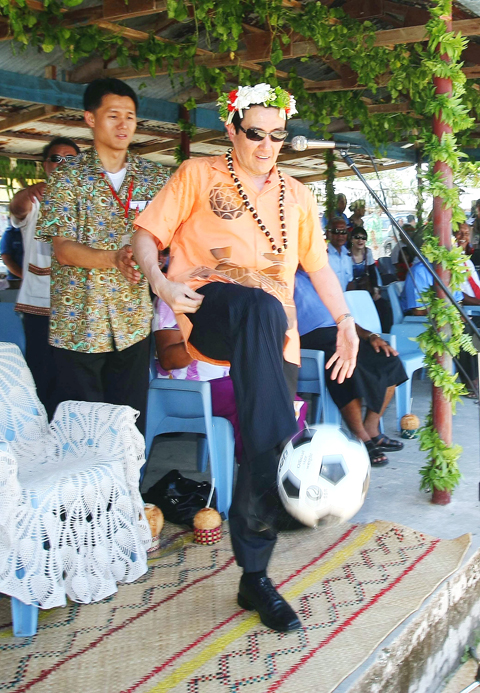President Ma Ying-jeou (馬英九) yesterday acknowledged Chinese Premier Wen Jiabao’s (溫家寶) comment on “yielding interests” to Taiwan, but said whether he meant it would hinge on China’s “attitude” during economic cooperation framework agreement (ECFA) negotiations with Beijing.
Ma said Wen’s remark was a gesture of goodwill, but his fundamental principle when negotiating with Beijing was that Taiwan’s interests come first.
“It does not mean we care only about Taiwan’s interests,” he said. “Sometimes when something benefits Taiwan, it also benefits the mainland. And sometimes when something benefits Taiwan, it is not necessarily harmful to the mainland.”

PHOTO: CNA
Ma made the remarks during a question-and-answer session at a press conference in Nauru yesterday afternoon. Ma is in the South Pacific on a six-nation visit.
During the National People’s Congress last week, Wen described Taiwan as “China’s brother.” He said that China would “let the people of Taiwan benefit” from tariff concessions and early harvest programs spelled out in the ECFA. He also said that “relevant arrangements” in the trade pact would help reassure Taiwanese farmers.
Ma yesterday said that he was happy to see Beijing realize the differences between Taiwan and “the mainland,” including the economy, development, population and tariffs. It was not true equality to ask both sides to be equal in these areas because of China’s size relative to Taiwan. However, genuine equality could be attained through proportionality, he said, and would be reflected in negotiations on tariffs, intellectual property rights (IPR) and investment protection.
Ma’s administration is seeking to sign an ECFA with Beijing in May or June. Both sides have agreed to address the issue of IPR protection during upcoming talks.
Ma said he was happy to see China wants Taiwan to benefit from the trade deal but whether this would happen depended on “the mainland’s attitude,” he said.
When asked about his thoughts on Wen’s description of Taiwan as “China’s brother,” Ma said people on both sides of the Taiwan Strait have the same roots, so the description “was not wrong.”
“But in Taiwan, the relationship between the government and the mainland operates under the constitution of the Republic of China,” he said. “Like I always say, the people on both sides of the Taiwan Strait belong to the Chinese nation.”

The High Prosecutors’ Office yesterday withdrew an appeal against the acquittal of a former bank manager 22 years after his death, marking Taiwan’s first instance of prosecutors rendering posthumous justice to a wrongfully convicted defendant. Chu Ching-en (諸慶恩) — formerly a manager at the Taipei branch of BNP Paribas — was in 1999 accused by Weng Mao-chung (翁茂鍾), then-president of Chia Her Industrial Co, of forging a request for a fixed deposit of US$10 million by I-Hwa Industrial Co, a subsidiary of Chia Her, which was used as collateral. Chu was ruled not guilty in the first trial, but was found guilty

DEADLOCK: As the commission is unable to forum a quorum to review license renewal applications, the channel operators are not at fault and can air past their license date The National Communications Commission (NCC) yesterday said that the Public Television Service (PTS) and 36 other television and radio broadcasters could continue airing, despite the commission’s inability to meet a quorum to review their license renewal applications. The licenses of PTS and the other channels are set to expire between this month and June. The National Communications Commission Organization Act (國家通訊傳播委員會組織法) stipulates that the commission must meet the mandated quorum of four to hold a valid meeting. The seven-member commission currently has only three commissioners. “We have informed the channel operators of the progress we have made in reviewing their license renewal applications, and

‘DENIAL DEFENSE’: The US would increase its military presence with uncrewed ships, and submarines, while boosting defense in the Indo-Pacific, a Pete Hegseth memo said The US is reorienting its military strategy to focus primarily on deterring a potential Chinese invasion of Taiwan, a memo signed by US Secretary of Defense Pete Hegseth showed. The memo also called on Taiwan to increase its defense spending. The document, known as the “Interim National Defense Strategic Guidance,” was distributed this month and detailed the national defense plans of US President Donald Trump’s administration, an article in the Washington Post said on Saturday. It outlines how the US can prepare for a potential war with China and defend itself from threats in the “near abroad,” including Greenland and the Panama

A wild live dugong was found in Taiwan for the first time in 88 years, after it was accidentally caught by a fisher’s net on Tuesday in Yilan County’s Fenniaolin (粉鳥林). This is the first sighting of the species in Taiwan since 1937, having already been considered “extinct” in the country and considered as “vulnerable” by the International Union for Conservation of Nature. A fisher surnamed Chen (陳) went to Fenniaolin to collect the fish in his netting, but instead caught a 3m long, 500kg dugong. The fisher released the animal back into the wild, not realizing it was an endangered species at